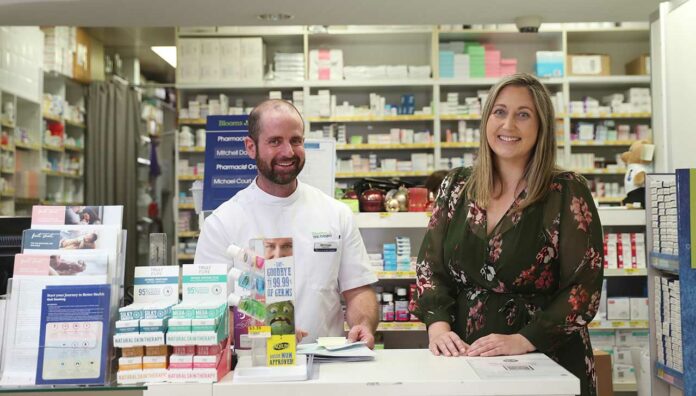Whether pitching collaboration ideas, PHN tenders or talking to politicians, all pharmacists must master the art of advocating for their own practice.
Every pharmacist has ideas on a better future for their practice – whether it’s remuneration, career opportunities, medicine safety or different ways of supporting patients.
Making these ideas a reality can be tricky. You need the support of others, including political support, to make your goals a reality. This could include tendering to Primary Health Networks for funding for commissioned services, or for proposals on potential collaborations with third-party funders.
So how can you get the government to recognise that a better reward for the services you provide is urgent – particularly in vaccine administration, where inequality with other healthcare providers is evident?
The answer? Being a more active advocate for your practice. And it starts with this year’s federal election.
‘The lead-up to the election is a great time to start building a relationship with your local MP and other candidates,’ says Candice Burch, PSA’s Manager – Public Affairs & Communications, and a former member of the ACT Legislative Assembly.
‘Both sitting and prospective politicians will be out and about in the community a lot,’ she advises.
‘Look for opportunities to engage with them. A good tactic is to contact them directly to seek a meeting, or better yet, invite them to visit your place of business. Politicians love a photo op, and it is a much better and more engaging way to have them learn and see your experiences.’
Her key advice? ‘Don’t be intimidated. Politicians are people who work for you. They want to meet their constituents and genuinely learn more about the issues you are facing.’
Where to start?
You are a pharmacist, not a public relations expert. ‘A good place is a candidate’s website,’ says PSA board member Sara Pantzer, who has had more than 25 years of senior executive experience as a government relations and advocacy practitioner in the pharmaceutical and biotech sectors.
‘See what issues the candidates have covered in their news releases; take note if they are a minister or shadow minister, and what portfolio they have. See if you can find a common interest, or a way to personally connect,’ she says.
‘For example, do your children go to the same school? Are they in the same sporting team? It’s always good to read an MP’s inaugural parliamentary speech. That will give you a good history and understanding of them,’ says Ms Pantzer.
‘Is there an electorate issue you could take forward to your local MP to open the conversation? Remember, state MPs have interests in roads, hospitals, schools, water and sewerage, and other local facilities like sports grounds, while federal MPs have interests in social welfare, taxation and economic management.’
Doing your research before you approach a politician or political candidate is vital, say both experts.
Ms Burch recommends following electoral candidates on social media and signing up to their newsletters. This will show the ‘issues they care about, where they will be in the electorate, and provide alerts to any “meet the candidate” type events they are hosting’, she says.
‘Familiarise yourself with who the candidates are, the suburbs covered by the electorate, and the margin enjoyed by the sitting member. Find out what portfolios the MP has, or what committees they sit on.’
| Get started with our draft scripts
Not sure what to say when calling your local MP? Want to write an email but stuck for words? You can find a draft phone script and a draft email script here. |
Meet the candidate
When you finally get the chance to stand in front of the candidate, don’t waste their time, advises Ms Burch. They are busy, especially in election mode.
‘Be prepared to introduce yourself in one sentence – like an elevator pitch! What is the issue, why should they care? And what is the problem you are solving for them? Focus on the issue and the personal story you have to tell – how it has impacted you and your experiences,’ she stresses.
‘Facts and figures are important, but personal stories will make you more memorable to them. Make sure you also keep your conversation concise, relevant and to the point.’
That first meeting, even if brief, is key to expanding the relationship.
Ms Pantzer says that like any good salesperson, you should use that first meeting as a chance to generate others.
‘If you can secure a meeting with your MP, canvass the issue on which the meeting is based, but use the opportunity to ask if they would like you to host a meeting with their constituents at your pharmacy.
‘Better still, why not create an event at your pharmacy which would represent a photo opportunity for them. These are great because they will attract the local media too. Which event? How about the moment your pharmacy hits a vaccination milestone of 1,000 or 10,000 jabs?
‘Another way to connect,’ says Ms Pantzer, ‘is to attend one of their fundraising functions, or a third-party event, which you will both be attending. Use the opportunity to talk informally with them and find out what sort of event might entice them to your pharmacy.’
 Persistence is best
Persistence is best
But what if they are reluctant? Political candidates can be almost as busy as pharmacists. Be relentless – in a friendly, polite and respectful way, Ms Burch warns.
‘Persistence helps demonstrate just how important this issue is to you, and how passionate you are about your community.
‘Create opportunities, rather than simply placing more pressure on them. If you see them holding street stalls or at community events, introduce yourself and mention that you have previously requested a meeting.
‘Take similar opportunities to introduce yourself to their campaign staff or volunteers. A candidate’s staff will pass on important information about the issues you have raised,’ says Ms Burch.
Framing your issue and pitching it to benefit them also, with local media coverage, introductions to voters, solving a problem or finding cost savings with better methods – it will all help, Ms Burch says.
Once the MP or candidate agrees to come to your pharmacy, how do you ensure it all goes to plan?
‘Work closely with their office,’ says Ms Pantzer, ‘on the invitee list and the type of function which would be most appropriate for them. Explain to them, or their staff, what you might like them to say in any speech. This is an opportunity for you to get them to buy into policy issues, such as pharmacist remuneration, so they are on the record supporting your cause.’
And, after an advance alert to the local media, ensure there is briefing material about you, your pharmacy and the relevant issues, for when the cameras turn up.
Build relationships with local media outlets and journalists in the same way you would with politicians, says Ms Burch.
‘Local media wants to tell local stories and is always on the hunt for new content – if you have a worthwhile story to tell,’ she explains. Engagement with media can be mutually beneficial, providing an opportunity to build awareness of your brand, both business and personal.
Long-term strategy
Phew. Everyone turned up and the footage is in the can. It’s all over, right? No, not yet, because political engagement is a long-term strategy.
‘Ensure you write them a thank you letter, with an open-ended invitation to do it again,’ says Ms Burch.
‘Provide any additional information that may be helpful, or point them in the direction of additional resources. Ask them for advice on how to achieve the outcome you are seeking, or what they need from you before they can give their support.’
She advises sending relevant media stories or reports to draw their attention, even as a situation changes. ‘Approach every interaction as an opportunity to build the relationship – don’t forget, unsuccessful candidates may go on to be successful candidates in the future, or they may take up jobs as political advisers.’
Her final word of advice? ‘You should see this as the start of a long-term relationship which will endure through mutual respect, trust and benefit.’
Visit PSA’s remuneration campaign page for more resources.



 Kelly Abbott MPS[/caption]
Kelly Abbott MPS[/caption]


 Owner of Canberra's Capital Chemist Southlands Louise McLean MPS.[/caption]
Owner of Canberra's Capital Chemist Southlands Louise McLean MPS.[/caption]

 Supplied by CSL Seqirus[/caption]
Supplied by CSL Seqirus[/caption]







